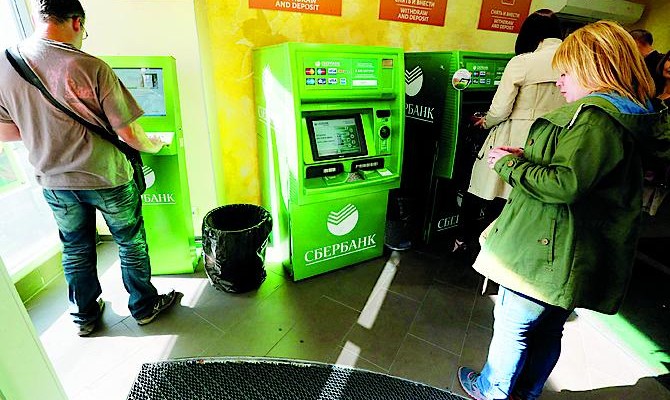Economy
SignalsUkrainians significantly reduced the volume of money transfers to their homeland

Ukraine is steadily losing hard currency receipts from migrant laborers. Over the first half of this year, the volume of private money transfers that last year guaranteed a greater influx of hard currency from abroad than foreign direct investments (FDI) fell by 13% to USD 3.3 bn, the National Bank of Ukraine calculated. The decrease in transfers from individuals living abroad began in the Q1 2014. However, in Q2 2014 transfers increased from 8% to 18% compared to the same period in 2013.
Ricochet from sanctions
Foreign receipts of hard currency from private individuals in Ukraine dropped mainly due to Russia, which accounts for around 36% of money transfers through official channels. The volume of such transfers from Russia fell by 14% to US $1 bn. As such, of the US $435 mn of the overall decrease in such transfers, Russian receipts accounted for one third (USD 160 mn).
This could be associated with the cooling of Ukrainian-Russian relations and the sluggish growth of the economy of Russia, which the sanctions of the West are undermining. The European Bank of Reconstruction and Development expects that the real GDP of Russia, which grew by 3.4% in 2012 and 1.3% in 2013, will not change this year. Meanwhile, the World Bank forecasts stagnation with Russia’s GDP growth at 0.5%.
Due to such weakening of the economy the EBRD report Regional Economic Prospects published in September reads that in Q1 2014 money transfers from Russia fell for the first time since 2009 by 5% to US $5.5 bn (data of the Central Bank of Russia). At that, the economies of Uzbekistan and Moldova, not Ukraine’s, suffered the most from this trend. And the more this has a negative impact on the Russian economy with each new wave of sanctions, the greater will be the risk of reduction in money transfers from Russia, the EBRD noted.
Money transfers of private individuals in low-tax jurisdictions also notably decreased. Transfers from Switzerland fell by 32%, from the Isle of Man – by 27%, from the British Virgin Islands – by 21%, from Cyprus – by 18% and from Panama – by 10%. Overall, the receipts from these five offshore zones fell by US $60 mn.
Psychological effect
By the way, the NBU is partially to blame for this as it is actively applying the practice of bans and limitations on the hard currency market in order to hold back the devaluation of the hryvnia. In the first half of this year these limitations applied to either hard currency transfers from Ukraine abroad or major hard currency transfers to Ukraine from abroad. In particular, up until mid-July a requirement of the obligatory sale of hard currency receipts from abroad to the benefit of individuals in the amount exceeding UAH 150,000 on the interbank market was in effect.
“This measure did not have an impact on transfers made by Ukrainians working abroad. As a rule, this money comes in once a month and in much lower amounts. However, it is possible that the NBU detected a number of major receipts which it cut off by imposing these limitations,” Senior Analyst of the International Center of Policy Studies Oleksandr Zholud presupposes.
If these limitations applied to a significant part of transfers, then in the first half of the year only transfers through official channels – i.e. correspondent bank accounts and international payment systems – would have experienced a decline, while receipts of money through unofficial channels (i.e. bringing in cash into the country) would have, on the contrary, increased.
However, according data of the NBU the former decreased by 13% to US $2.8 bn and the latter – by 14% to US $453 mn. This means that senders and recipients of direct transfers were more apprehended by the instability of the banking system and the economic situation in Ukraine at large. “Many administrative measures of the NBU relieve short-term pressure on the hryvnia, but in the mid-term prospects they only do damage to the market, which incites in people reluctance to use the services of banks,” Zholud believes.
In the second half of the year the NBU continued to take measures that did not foster a flow of private hard currency transfers to Ukraine. From September 2 the NBU imposed mandatory conversion of foreign currency transfers to individuals into hryvnia in order to reduce the needs of banks for hard currency to satisfy the demand of citizens for converting transfers from abroad into cash. As Director of the General Department of Monetary and Credit Policy of the NBU Olena Shcherbakova specified, in order to avoid forced conversion recipients of a transfer must open a bank account. On the one hand, the money transfers from Ukrainians working abroad, as a rule, are meant for their relatives that do not save hard currency, but instead exchange them for hryvnia and spend them on daily needs. On the other hand, bankers feared that transfers that are intended to stock up on hard currency cash savings are fading away into the shadow economy. They also warned that even in the case of money transferred through official channels the recipients will simply convert it once again into hard currency. After such harsh criticism, as of September 23 the NBU cancelled this norm. Nevertheless, the attempt to introduce it could scare off individuals from effectuating money transfers.






 of the agreement of syndication with Financial Times Limited are strictly prohibited. Use of materials which refers to France-Presse, Reuters, Interfax-Ukraine, Ukrainian News, UNIAN agencies is strictly prohibited. Materials marked
of the agreement of syndication with Financial Times Limited are strictly prohibited. Use of materials which refers to France-Presse, Reuters, Interfax-Ukraine, Ukrainian News, UNIAN agencies is strictly prohibited. Materials marked  are published as advertisements.
are published as advertisements.